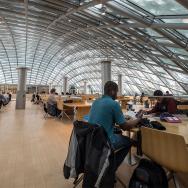Looking for your next summer read or watch? Look no further.
UChicago News asked the 2025 winners of the Quantrell and PhD Teaching and Mentoring Awards for books and media they’ve found interesting, useful or meaningful.
Here are their recommendations.
Paradise Lost by John Milton
In my view, John Milton's Paradise Lost is the best thing written in the English language. It's difficult, demanding, intricate and immensely rewarding, an almost unbelievable human accomplishment powered by vision and learning of staggering proportions. If you haven't read it, you really ought to. Each time I re-read it, deeper and more expansive meanings emerge. I'm sure this will happen again as I re-read the poem this summer in preparation for teaching a class on it next year.
—Prof. Timothy Harrison
Playground by Richard Powers
Playground is a deep and thoughtful story that was insightful and meaningful to me in so many different ways, from ocean conservation to AI in our lives. Powers captures the complex relationships of several fascinating characters that are passionate about either the natural or the virtual world.
—Prof. Cathy Pfister
Think Again by Adam Grant
I recommend Think Again to help people appreciate that not everything you read in black and white is accurate. You've always got to ask questions, and to not be afraid to be wrong.
—Prof. Kay Macleod
The Wide Wide Sea by Hampton Sides
This non-fiction book tells the story of James Cook's final and fateful voyage, and it's full of observation, adventure and historic detail. Sides provided a glimpse into what it might have been like to explore these vast Pacific Ocean areas and, of course, the human interactions that forever changed the places that they visited.
—Prof. Cathy Pfister
Dreams of My Russian Summers by Andreï Makine
This is a beautifully told story, written from the point of view of a boy whose French grandmother ends up trapped in the Soviet Union. It’s told in first-person narrative and, although it’s a fictional account, it gives a vivid perspective on what it was like in the early Soviet times. It tells a deeply personal story of being torn—and caught—between two different worlds, one in France, one in the USSR, and all the joy and sorrow of the times. It’s a vivid account that makes history come alive for me.
—Prof. Lenore Grenoble
The Code Breaker: Jennifer Doudna, Gene Editing, and the Future of the Human Race by Walter Isaacson
This is a great book for both casual readers and scientists alike. The Code Breaker is about one of the most important scientists—Jennifer Doudna—and important discoveries—the CRISPR technology—of the century so far.
This book is timely, as the role of science in education, health and our economy is currently being challenged. The story of Doudna and CRISPR is a tale of basic, inquiry-driven research conducted by a brilliant scientist supported by the Federal Government, which ultimately led to a deeper understanding of the biological world and a Nobel Prize.
More broadly, the technologies that emerged from this work changed the way we all do biomedical research, and have now led to therapeutic platforms that have given birth to multiple billion-dollar U.S. companies developing drugs that are changing the lives of patients through curative treatments. The Code Breaker is a beautiful illustration of why science—and scientists—matter to our society.
—Prof. Bryan Dickinson
The One Best Way: Frederick Winslow Taylor and the Enigma of Efficiency by Robert Kanigel
When we think about what’s driven big leaps in productivity over the past 150 years, it’s easy to point to breakthrough technologies—like electric lights, phones, cars, computers, and now AI But none of those inventions would’ve had such a huge impact without the behind-the-scenes advances that helped turn them into everyday products people could actually use. This book brings that point home by spotlighting Frederick Winslow Taylor, the father of scientific management. He pushed industry to chase efficiency and look for the “one best way” to do every task. His ideas didn’t just reshape factory work—they laid the groundwork for how we organize almost everything today. After reading it, you’ll start to notice just how much of our daily routines and surroundings still echo Taylor’s push for better lives for all.
—Prof. John Birge
Deadwood (TV series 2004-2006)
The iceberg of subtext underlying each action, look and line. Career-best performances from the whole (expansive) cast. The very best: Al Swearengen.
—Assoc. Prof. Alex Shaw
Want more recs? See recommendations from previous years.

